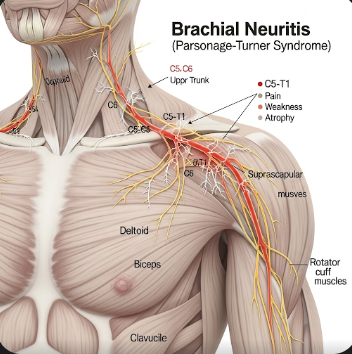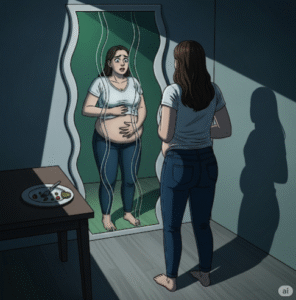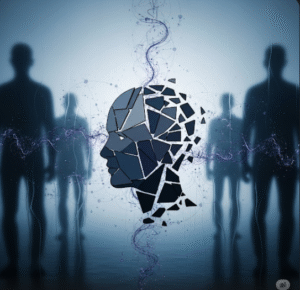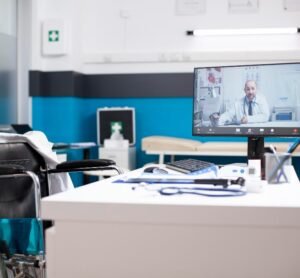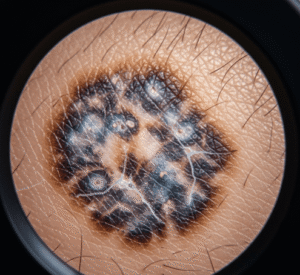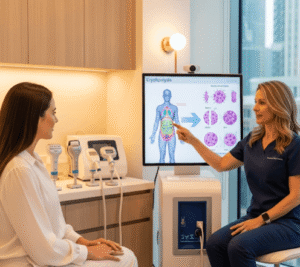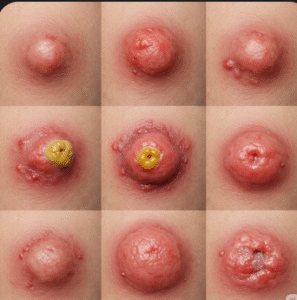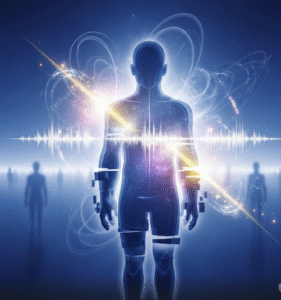Overview
Brachial neuritis, also known as Parsonage-Turner syndrome or neuralgic amyotrophy, is a rare neurological disorder affecting the brachial plexus, the network of nerves that sends signals from the spine to the shoulder, arm, and hand. The condition is characterized by sudden onset of severe shoulder or arm pain followed by muscle weakness and atrophy.
In Korea, brachial neuritis is managed in neurology and orthopedic clinics, with a focus on accurate diagnosis, pain management, physical therapy, and rehabilitation. Korean healthcare provides advanced imaging, nerve studies, and multidisciplinary approaches to optimize recovery and restore function.
What is Brachial Neuritis?
Brachial neuritis is a nerve disorder primarily involving inflammation and injury of the brachial plexus, often triggered by infections, surgery, vaccinations, or autoimmune reactions. The disorder typically:
- Affects one shoulder and arm, though both sides can be involved rarely
- Begins with sudden, severe, stabbing pain lasting days to weeks
- Progresses to weakness, numbness, and muscle wasting in the affected limb
- Can result in limited mobility and functional impairment
Brachial neuritis is self-limiting in many cases, but recovery can take months to years, and some patients may experience residual weakness or chronic pain.
Symptoms
Symptoms often appear in distinct phases:
Acute phase:
- Sudden, severe shoulder or upper arm pain
- Pain may radiate down the arm or to the scapular region
- Pain is usually unilateral but can occasionally affect both sides
- Pain often worsens at night or with movement
Weakness and atrophy phase:
- Muscle weakness in the shoulder, arm, or hand
- Loss of reflexes in the affected limb
- Visible muscle wasting around the shoulder and upper arm
- Reduced range of motion and difficulty lifting or rotating the arm
Recovery phase:
- Gradual improvement over months
- Persistent weakness or mild functional deficits in some cases
- Possible lingering numbness, tingling, or pain
Causes
The exact cause of brachial neuritis is not always clear, but several triggers have been identified:
- Autoimmune reactions: Immune system mistakenly attacks nerve tissue
- Recent infections: Viral infections such as influenza or hepatitis
- Vaccinations: Rarely, vaccines may trigger immune-mediated inflammation
- Surgery or trauma: Physical stress to the shoulder or chest area
- Genetic factors: Certain inherited forms are observed in families
- Other triggers: Stress, intense exercise, or metabolic disorders
The condition reflects inflammation, demyelination, or axonal injury of the nerves in the brachial plexus.
Risk Factors
- Age: Most common in adults aged 20–60
- Gender: Slightly more frequent in men
- Recent viral infection or vaccination
- History of autoimmune disorders
- Genetic predisposition in familial cases
- Physical stress or trauma to the shoulder
Complications
While many patients recover completely, complications can occur:
- Persistent weakness or atrophy
- Chronic pain or neuropathic pain in the affected limb
- Limited shoulder mobility impacting daily activities and work
- Psychological effects: Anxiety, depression, or reduced quality of life due to functional limitations
- Recurrent episodes: Rare, but some patients experience multiple attacks over time
Prevention
There is no guaranteed prevention for brachial neuritis, but certain strategies may reduce risk:
- Prompt treatment of infections to minimize immune triggers
- Safe vaccination practices and monitoring for adverse reactions
- Gentle exercise and physical therapy after trauma or surgery to maintain mobility
- Early medical evaluation for shoulder or arm pain to rule out other conditions
- Management of autoimmune conditions to reduce risk of nerve inflammation
Treatment Options in Korea
Diagnosis
Accurate diagnosis is essential to differentiate brachial neuritis from rotator cuff injuries, cervical radiculopathy, or shoulder arthritis:
- Medical history: Onset of pain, recent infections, vaccinations, or trauma
- Physical examination: Assessing muscle strength, reflexes, and range of motion
- Electromyography (EMG) and nerve conduction studies: Confirm nerve damage and locate lesions
- MRI of the brachial plexus: Detect inflammation or structural abnormalities
- Blood tests: Evaluate for autoimmune markers or recent infections
Medical Management
- Pain management:
- Non-steroidal anti-inflammatory drugs (NSAIDs)
- Short-term corticosteroids to reduce nerve inflammation
- Neuropathic pain medications such as gabapentin or pregabalin
- Supportive care:
- Immobilization initially to reduce pain
- Gradual mobilization and gentle exercises once pain subsides
Rehabilitation
Physical therapy is critical for functional recovery:
- Range of motion exercises to prevent stiffness
- Strengthening exercises targeting weakened muscles
- Occupational therapy for daily activity adaptation
- Long-term follow-up to monitor recovery and manage residual deficits
Surgical Options
Surgery is rarely required and only considered in cases of:
- Severe nerve compression not responding to conservative treatment
- Persistent functional deficits after prolonged recovery
- Tendon or muscle transfers to restore lost function
Prognosis
The prognosis of brachial neuritis in Korea is generally favorable:
- Most patients recover within 6–12 months, with gradual improvement in strength and mobility
- Residual weakness may persist in 10–20% of cases
- Chronic pain can occur but is manageable with medication and therapy
- Korean hospitals provide specialized neurology, physiotherapy, and pain management services, which improve outcomes and enhance quality of life
- Early diagnosis and multidisciplinary rehabilitation are key factors for optimal recovery
With advanced diagnostic tools, rehabilitation programs, and expert neurological care available in Korea, patients with brachial neuritis can expect effective management, gradual recovery, and minimal long-term disability.

